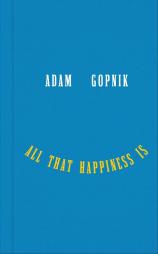All That Happiness Is: Some Words on What Matters
Review
All That Happiness Is: Some Words on What Matters
In his 2023 book, THE REAL WORK: On the Mystery of Mastery, Adam Gopnik drew from his own experience as a novice in activities that ranged from baking to boxing, urging readers to “better see yourself as a self, a constructed self, made out of appetites turned into accomplishments.” One might consider ALL THAT HAPPINESS IS --- a single essay about the length of one of Gopnik’s longer pieces for The New Yorker, his home as a staff writer for nearly four decades --- to be a brief yet inspiring coda to his earlier work.
"[T]he beauty of ALL THAT HAPPINESS IS is that it just might be enough to inspire the most timid among us to pick up a paintbrush or a guitar purely for the fun of it."
Gopnik begins in his bedroom in 1968 when, as a 12-year-old with a $40 folk guitar and a giant book of Beatles songs, he struggled to master basic chords. Distinguishing between this kind of self-motivated effort and what he calls “achievements,” which involve completing a task imposed from without, he opines that “happiness is always rooted in absorption in something outside us, and begins in accomplishment undertaken for its own sake and pursued to its own odd and buzzing ends.” In Gopnik’s case, those halting efforts on the guitar became “a touchstone of sorts for me, and a foundation for almost every meaningful thing I’ve done since.”
That’s the spirit that suffuses Gopnik’s encouragement --- as with the French root “to love” in the word “amateur”--- to embrace the “beautiful paradox” that “pursuing things we may at first do poorly can produce the sense of absorption, which is all that happiness is, while persisting in those we already do well does not.” When it comes to activities undertaken for the sheer joy they bring the participant, the only failure, he gently reminds us, is the failure to try.
As the piece ends, Gopnik widens his lens to offer some ingredients that might go into a recipe for making our society a happier one. In his view, “healthy societies also have a variety and abundance of pursued public pleasures.” Citing the work of Frederick Law Olmsted, the designer of Central Park --- a beautiful public space that serves “a kind of canvas on which we can paint our own pictures, an apparatus for our own accomplishment” --- he argues that “the more confidently we pursue our own accomplishments, the less time we have to hate and fear other people’s,” which is good for both individual and society.
However slight it may seem when compared to other entries in Gopnik’s extensive body of work, the beauty of ALL THAT HAPPINESS IS is that it just might be enough to inspire the most timid among us to pick up a paintbrush or a guitar purely for the fun of it.
Reviewed by Harvey Freedenberg on April 27, 2024
All That Happiness Is: Some Words on What Matters
- Publication Date: April 23, 2024
- Genres: Nonfiction, Personal Growth, Self-Help
- Hardcover: 64 pages
- Publisher: Liveright
- ISBN-10: 1324094850
- ISBN-13: 9781324094852




